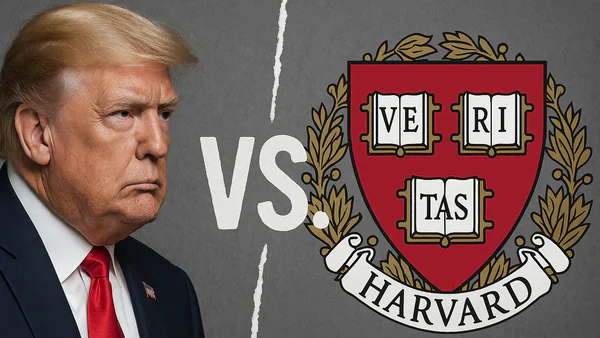Why Trump’s Policies Target Harvard and the Future of Academic Freedom
Harvard University has become a focal point in recent debates over academic freedom in the United States, with critics pointing to the impact of current political leadership on higher education.
Background
America’s universities have historically been regarded as global leaders in research, innovation, and intellectual freedom. Their rise accelerated after 1939, when European academics fleeing Nazi persecution helped shape institutions like Harvard, MIT, and Stanford. Over the decades, these universities produced Nobel laureates, advanced scientific discovery, and supported new enterprises that strengthened the U.S. economy.
Current Tensions
In recent years, however, universities have faced political and financial challenges. The Trump administration has restricted discussions on equity, diversity, affirmative action, climate change, vaccine efficacy, and criticism of Israel, labelling many of these areas as “woke.” In 2024, Vice President J.D. Vance declared that “professors are the enemy,” reflecting a growing hostility toward academic institutions.
Columbia University recently agreed to pay hundreds of millions of dollars in damages and settlements in exchange for the restoration of federal research funding. Following this, Harvard has also come under pressure, with the federal government withholding $9 billion in funds and revoking its eligibility to host international students. Lawsuits have been filed, and other universities are closely watching the outcome.
The Role of Academic Freedom
Harvard, despite its shortcomings—including historic ties to political elites and controversial admissions practices—has long upheld its motto, Veritas (truth). The institution has provided a space where uncomfortable ideas could be debated, contributing to advancements in fields ranging from cosmology to the social sciences.
Analysts note that academic freedom remains the key factor distinguishing leading global universities. By contrast, authoritarian governments often restrict such freedoms, considering them obstacles to centralized control. Comparisons have been drawn to institutions such as Jawaharlal Nehru University in India, which once had a reputation for open discourse but has since faced restrictions.
South Asian Perspective
The situation has also highlighted contrasts with South Asia. In Pakistan, universities founded during the British colonial period never fully adopted the ethos of free inquiry. Post-independence, the quality of institutions declined further as religious and political pressures grew. Today, critics argue that universities function more as controlled spaces than centers of academic freedom, with limited emphasis on intellectual independence.
Outlook
Observers suggest that the fate of Harvard under current U.S. policies could serve as a test case for the resilience of academic freedom. While America’s universities remain internationally prestigious, ongoing restrictions and political battles raise questions about how much of their independent spirit will survive in the years ahead.
Note: The article was written by Pervez Hoodbhoy, a physicist, public intellectual, and member of Convisero – the community of Trebuchet.

